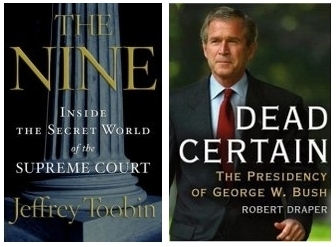There has been much ado indeed about Dead Certain, the inside-the-Bush- White-House tome by GQ's Robert Draper that hits bookshelves today (Infighting in Bush's inner circle! Bush blaming Bremer for disbanding the Iraqi army — and Bremer striking back! You won't see Bush hanging out at the U.N. after he's out of office — he wants to do nothing after his Presidency! (Insert joke about obscene vacation day count here.) All very juicy, exciting stuff.
But there's another big book slated for September: The Nine, CNN/New Yorker scribe Jeffrey Toobin's hotly anticipated inside-the-Supreme-Court tome, out on Sept. 18th. Chapter 22, "I Know Her Heart," is about the abortive nomination of Harriet Miers to the Supreme Court (unintentional Roe pun, but hey, ). Toobin traces the genesis of the nomination from the resignation of Sandra Day O'Connor through to Miers' withdrawal from the nomination, ostensibly to preserve executive privilege.
Which is why I was surprised to read this in the WaPo article about the Draper book:
When Rove, President Bush's top political adviser, expressed concerns about the Miers selection, he was "shouted down" and subsequently muted his objections, Draper writes, while other advisers did not realize the outcry the nomination would cause within the president's conservative political base.
It was John G. Roberts Jr., now the chief justice of the United States, who suggested Miers to Bush as a possible Supreme Court justice, according to the book. Miers, the White House counsel and a Bush loyalist from Texas, did not want the job, but Bush and first lady Laura Bush prevailed on her to accept the nomination, Draper writes.
This does not dovetail with Toobin's account, which had Rove distracted by Plamegate and coming to the nomination process almost two weeks late, kicking off his involvement after the Miers nomination was a fait accompli with an October 2nd call to James Dobson. Nor does it say anything about Roberts suggesting Miers for the spot — a pretty shocking suggestion, given his then brand-new status as Chief Justice and what that might say about his agenda for the court.
So I asked Toobin about the inconsistency, who admits to having been "struck" by the Draper revelations — but more so struck by the official denial on the part of Supreme Court spokeswoman Kathy Arberg. "The Supremes rarely react to stuff in the press, one way or the other," said Toobin. Toobin reiterated that Senator Harry Reid had suggested Miers in a meeting with Bush on Sept. 21, 2005, after which Bush had offered — and Miers accepted — the nomination (Toobin's book traces the first suggestion of Miers to July 2005 by then WH Chief of Staff Andrew Card, who — fun fact! — makes news in Draper's book as having been "surprised and hurt" by the quickie nomination of his own replacement, Josh Bolten). At any rate, Toobin attributes the difference between his and Draper's account as probably a case of broken telephone: "The White House tried the idea out on a variety of people, including, no doubt, Roberts, who got to know Miers during his confirmation hearings. I'm sure he said nice, polite things about her, which someone may have construed as an endorsement for the Court."
Toobin's response was nice and polite itself, but here's my less-than-polite take: What was Draper smoking when he wrote that? It struck me immediately that for Roberts to have suggested Miers made NO SENSE on about a zillion levels, from having a political tin ear to exposing himself as a Machiavellian operator trying to stack the court to risking his own reputation on a complete non-scholar to whaaaaaaaaaaaaaa? I think my last reason is the most compelling. But Roberts, who carefully gave nothing away during his confirmation hearings (much to the dramatic and heartfelt consternation of Chuck Schumer, some may recall), seems by far a more careful and, well, judicious operator than that. To throw your very newfound weight behind, well, a lightweight so soon in the game strikes me as a move for a more impulsive and erratic personality. Say, Scalia.
